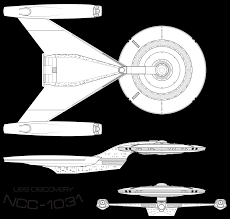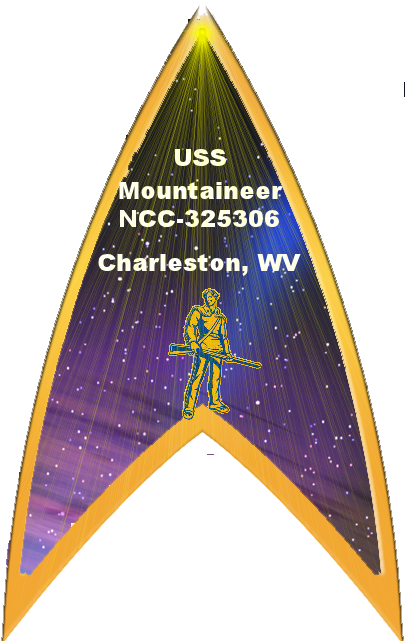The USS Mountaineer is a Crossfield Class Science and Warship
Based off the USS Discovery NCC-1031A Refit.
The ship was created as a direct result of the loss of the
recreated prototype Spore Drive that was stolen by Ruon Tarka
during the incident with the DMA miner sent by
Species 10-C.
The USS Mountaineer's motto is "Ad audacter ire
ubi Montani semper Liberi"
Which when translated
into Federation Standard means
"To go boldy where the mountaineers are always free"
The ships name is based upon a old Earth Battleship
Named the USS West Virginia BB-48 often referred to
as the Mountaineer Battle Wagon.
According to historical records the USS-West Virginia was
involved in several active engagements during her commissioned
time.
To current knowledge The USS Mountaineer is the second ship
to bear the name
Mountaineer.
The Crossfield class was a type of Federation starship in service during the
mid-23rd century. Though officially designated as a science vessel, during the
Klingon-Federation War the class was re-classified as a warship.
Deck 01: Bridge
Deck 02: Transporter, Equipment Locker
Deck 03: Science Labs
Deck 04: Tactical Systems
Deck 05: Mess Hall, Sickbay
Deck 06: Engineering Lab, Environmental Systems
Deck 07: Armory, Gym, Damage Control
Deck 08: Subspace Relays
Deck 09: Mess Hall, Transporter
Deck 10: Hydroponics
Deck 11: Torpedo Launcher
Deck 12: Shuttle Bay
Deck 13: Shuttle Bay, Deflector Control, Storage
Tanks
Deck 14: Shuttle Bay
Deck 15: Shuttle Bay
Deck 16: Engineering Lab, Torpedo Launcher, Main
Eng
Deck 17: (We call this the PARTY DECK)
Deck 18: Cargo Bays
32nd century refit
During the late 3180s, the Crossfield-class underwent an extensive retrofit. The
process took around three weeks to complete and the overall layout was
near-identical to before consisting of a saucer section, a wide secondary hull,
and two elongated nacelles. However, there were several alterations both
aesthetic and design wise. For example, the hull was no longer copper colored
and instead was chrome. More major changes were the complete removal of the
connecting corridors between the outer ring and inner ring as well as the
formerly round deflector dish were given an overhaul as it now appeared
hexagonal.
The nacelles were now physically detached but remained connected to the vessel
through magnetic seals using superconductors which enabled an improved level of
maneuverability during flight. While the warp drive or spore drive was active,
the nacelles resumed their former position without detachment. Additionally, the
secondary hull appears to have been gutted and changed to accommodate newer
impulse engines, with a different shape; the neck of the ship was thinner with a
more V-shaped appearance from the rear view, fewer windows, and was generally
sleeker.
The turboshafts were entirely removed and were now free floating inside the ship
with the magnetic levitation tracks being constructed as the turbolifts moved,
thanks to programmable matter.
Tactical systems
Following the retrofit, Crossfield-class vessels acquired a standard Federation
cloaking device like many ships in the era, allowing ships of this class to
cloak. The act of cloaking was accompanied by a green alert. In 3189, the spore
drive could not function while cloaked but this problem was rectified by the
following year.
The armaments did not change much, still consisting of deflector shields, photon
torpedoes, and phasers, albeit they were all upgraded to be on par with 32nd
century weaponry. For example, the phasers no longer fired blue beams but rather
green using an unknown particle composition and the shields were now reinforced
enough to hold out against an entire fleet of starships firing on it in
comparison to previously failing after a single quantum torpedo detonation.
Programmable antimatter was used to fortify the shields in anticipation for
crossing the galactic barrier.
Propulsion systems
As part of the ship's refit, Adira Tal also included an upgrade to the spore
drive reaction cube as well as converting the physical injector shunts into
nanogel control interfaces which acted as a quantum transducer. The impulse
engines were updated to conform to 32nd century standards and the warp core was
completely replaced, technically twice as the originally overhauled warp core
was ejected and subsequently exploded.
Furthermore, considering plasma conduits was obsolete, Jett
Reno replaced them with the now typical polaric warp conduit.
Computer systems
After the refit, the Crossfield-class no longer utilized duotronic circuitry
within its computational systems. Instead, it favored angular isolinear chips
within the main computer core. In addition to all current Federation databases
of the 32nd century, the ship had access to data lost or damaged during The Burn
as well as a hundred thousand years of observations experienced by the Sphere,
including statistical measurements of Kaminar, artificial intelligence, Trill,
and Trill symbionts.
The merger of the Sphere and the Discovery initiated a natural evolution of the
ship's computer, which was accelerated by the integration of 32nd century
technology resulting in Zora. Zora was a fully sentient AI with emotions and
unlimited access to all of the ship's systems including her own programming,
meaning she had autonomous operation of her existence and could prevent herself
from being removed in addition to altering her core parameters.
Scientific systems
Discovery's facilities were capable of supporting over three hundred discrete
scientific missions – a Starfleet record in 2256.
Sensors included multiphasic scanning capabilities.
Interior design
The ships' design featured polygonal windows to space in crew support
compartments including the mess hall and crew quarters. Those same rooms, as
well as sickbay and the corridors, mirrored the window design through recessed
alcoves on the wall.
Main bridge and command deck
The main bridge was located on Deck 1, with a central command chair for the
commanding officer, turbolift access at the front-starboard and rear-center, and
a computerized transparent window-viewscreen. Clockwise from the center command
chair, the bridge stations comprised of a free-standing multi-purpose station,
science, another free-standing multi-purpose station, tactical, helm,
operations, spore drive control, communications, and a free-standing science
station.
Off of the bridge was the captain's ready room, where, on the
Discovery, Captain Gabriel Lorca kept a bowl of fortune cookies on his standing
desk.
In 2257, Captain Christopher Pike favored a ready room disconnected from the
bridge. This ready room featured a more personalized décor, additional seating,
and a conference table as well as a food synthesizer slot and several computer
panels.
Engineering
Paul Stamets and his Glenn counterpart Straal operated their spore drives from
engineering test bay alpha, a standard engineering workspace specially converted
for that purpose.
Aboard Discovery, the engineering lab was highly classified and required a
breath print for access. Immediately off of main engineering was a cultivation
bay where Stamets was growing his own prototaxites stellaviatori spores. Aboard
Discovery's sister ship, the Glenn, the engineering section was highly shielded,
and the hull was double reinforced, preventing transport after a spore drive
disaster.
The Glenn had modified the reaction cube in their engineering to hold the
tardigrade, as Discovery later did as well.
Disassembly of spore drive equipment aboard the Discovery began in 2257, opening
up the engineering lab with exposed conduits and machinery. Nevertheless, the
spore drive was still operational.
Medical facilities
Sickbay was located on Deck 4 and featured three biobeds. Similar to on the
NX-class, sickbay was much more brightly colored than the rest of the ship,
being a near white color.
A second sickbay, Sickbay 2, was equipped to treat overflow and noncritical
injuries.
Transport and cargo
Shuttlebays were also present on Crossfield-class starships, with force fields
utilized to contain the atmosphere, as was common on starships.
The shuttlebay contained a large platform, delineated by the vessel's insignia,
which descended and rotated to enable access to a launch facility for landing
pods. Four pods were stored there, leading to a single launch rail and exterior
port. Aboard the Glenn, the lower stores in the engineering hull were one of the
largest storage facilities on the ship.
Transporter systems
The transporter room aboard Crossfield-class ships occupied a corridor room. The
back of the room was a circular alcove containing the transporter pad. The steps
of the transporter glowed red when in use.
Crew quarters
Crew quarters of the mid-23rd century tended towards spartan, with only minimal
options for customization or decoration. Aboard Discovery, senior officers were
assigned their own personal quarters, while junior officers shared quarters.
Crew quarters featured holographic projectors capable of producing a "mirror"
image, and a holo-communicator.
Guest quarters were located on Deck 3.
Science labs
Aboard Discovery, Lorca kept his own research lab, containing weapons and
specimens that he'd collected (Harry Mudd referred to this lab as Lorca's "man
cave"). Located on the lower decks of the engineering hull, this lab featured a
holding cell and a window viewing starboard.
Science lab, formerly the captain's ready room (2257)
Following Captain Pike's decision to move the captain's ready room to another
location in 2257, the ready room attached to the bridge was converted into a
science lab. Numerous pieces of scientific equipment (including a Vulcan data
module) were moved into the section, the large window being separated into two
ports by a computer terminal, and a large, transparent computer interface
subdividing the room.
Recreation facilities
Crossfield-class starships offered a mess hall capable of serving a few dozen
officers at once from five food synthesizers.
Ships of this class also had a room, possibly a gym, for sparring.
|
![]()

